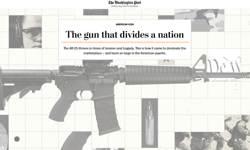As reported by the National Union of Journalists: The union called for a meeting with Mayor Sadiq Khan to discuss the recommendations made in the committee's report, The fate of local news – read all about it.
They are:
• The Mayor should ensure that news outlets in London pay all staff at least the London Living Wage.
• The Mayor, alongside the National Union of Journalists, should establish a digital journalism apprenticeship.
• The Mayor should work with organisations to fund bursaries for journalists to tackle the lack of diversity in local news.
• Transport for London (TfL) should set up a trial offering of local newspapers on specific London bus routes, to ensure that groups who are digitally and news-excluded have access to local news
The NUJ’s submission to the economic committee’s inquiry had recommended the mayor set up a meeting with the capital’s main media organisations to discuss the report’s conclusions and the need for proper pay and staffing levels for local newspaper and radio journalists to enable them to afford to live in the capital.
The report said the circulation figures of five of London’s paid-for newspapers fell by more than half between 2005 and 2016. It added that, faced with falling sales, newspaper owners had cut jobs and cut costs. This would lead to the danger of a “democratic deficit”, where if local newspapers continued to scale back coverage of borough councils, courts and the local effects of national government decisions, Londoners would not have the knowledge and evidence to make informed choices during elections. It said: “As local newspapers concentrate on their web presence, there is evidence of less ‘on-the-ground’ news reporting or investigative journalism…London needs a strong and credible local press. Without addressing the challenges the industry is facing, and finding solutions, we are at risk of losing one of our most important democratic functions. Action needs to be taken now to change the path for local newspapers. The decline of the industry and its impact on the workforce is leading to a less-credible news source. Hyperlocal news sources are a great addition to the industry, but questions remain about their ability to survive as they are often reliant on volunteers and can struggle to get reliable sources of funding.”
The situation in the capital has worsened since the committee launched its inquiry with the closure of three titles in north London, the Barnet Press, Enfield Advertiser and Haringey Advertiser. It took less than a week from the announcement of the closures for the final editions to be published. The NUJ has argued for newspapers to be assigned as community assets to prevent newspapers being closed overnight and giving local communities the opportunity to buy the titles or find new owners.
These Tindle closures came hard on the heels of Capital Media Newspapers, owner of the South London Press (SLP), Greenwich Mercury and weekly titles in west London, going into administration. A buyer for the SLP and Mercury has been found, but the Kensington & Chelsea News, Fulham Chronicle, Hammersmith Chronicle and Shepherd’s Bush Chronicle have shut. In an article in NUJ Informed, investigative journalist David Hencke asked if the deaths following the fire at Grenfell Tower could have been avoided if local journalists had been able to act as watchdogs, listening to their readers and holding the council to account.
Séamus Dooley, NUJ acting general secretary, said: “The fate of local news – read all about it is a very important report and its warnings must be heeded. The NUJ would be happy to explore all proposals with the mayor. We believe there is already a democratic deficit – and not just in London. Many media organisations have imposed severe cuts in editorial budgets; they no longer cover local authorities and investigative journalism is perceived as an expensive luxury rather than a necessity. London needs journalists who earn enough to afford to live in the capital and who represent the great diversity of this city.
"The demise of local media is not inevitable; newspapers need to invest in editorial resources to survive. The support for our Local News Matters campaign shows the decline of the press need not be a self-fulfilling prophesy."
Laura Davison, NUJ national organiser, said: "There has been an escalation in the crisis facing London’s local papers since the committee held its evidence sessions earlier this year. Communities have lost their voice as journalists have lost their jobs and titles have been shut or sold on. Some have voted with their feet and left journalism for better-paid work with less stress. It is right that the committee has recognised the shocking pay and conditions in the capital for many ordinary journalists which are also a barrier to improving diversity. When wages are cut, papers close and jobs are axed, then opportunities disappear and potential journalists are lost to the sector. Our members will be looking for urgent action in the wake of this report.”
Fiona Twycross AM, author of the report, said: “Having an active local news force is essential to ensure we are able to hold to account government, local councils and other organisations that have huge responsibilities to Londoners. We have seen a flurry of job losses and local news publications go under recently and this is a worrying trend.
"Local news must be protected. As local news publications look to the future, it is essential that we don’t leave those who are digitally excluded behind. Urgent action is needed to support local news and the mayor of London can show real leadership in standing up for local news at this critical time.”










